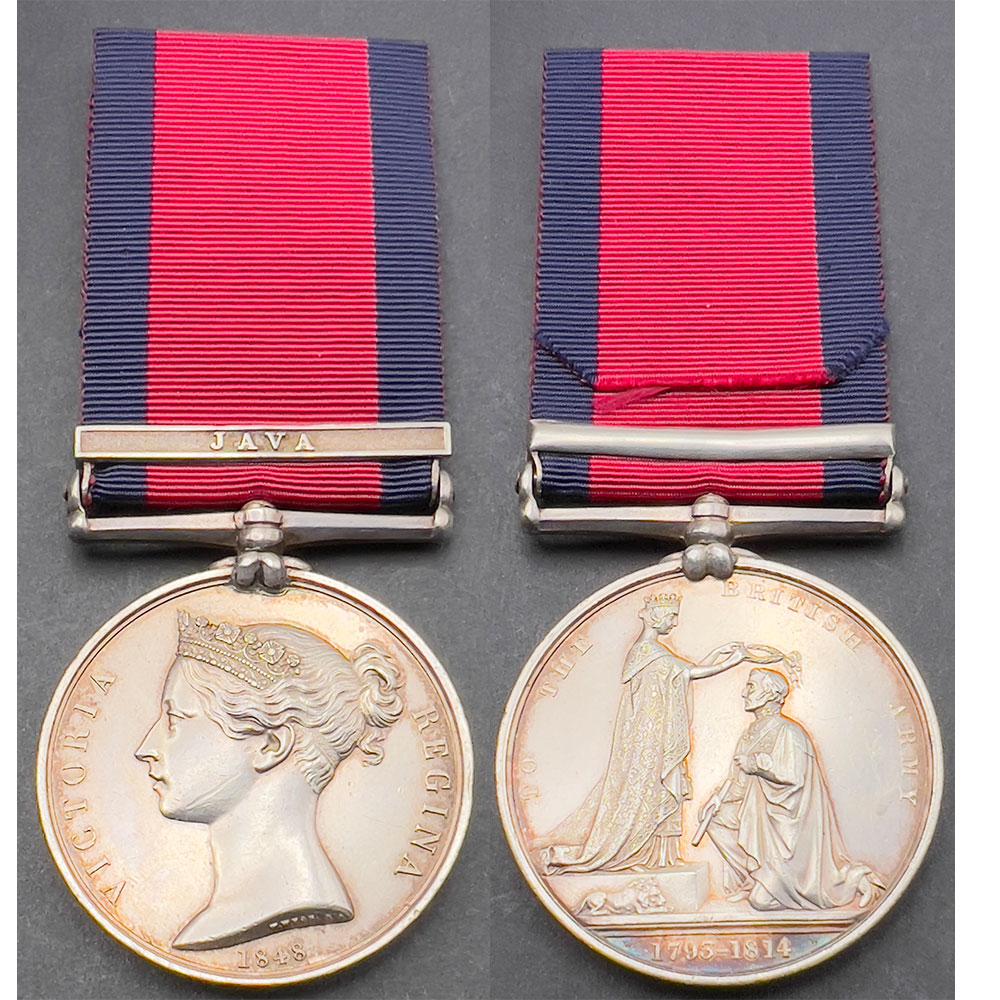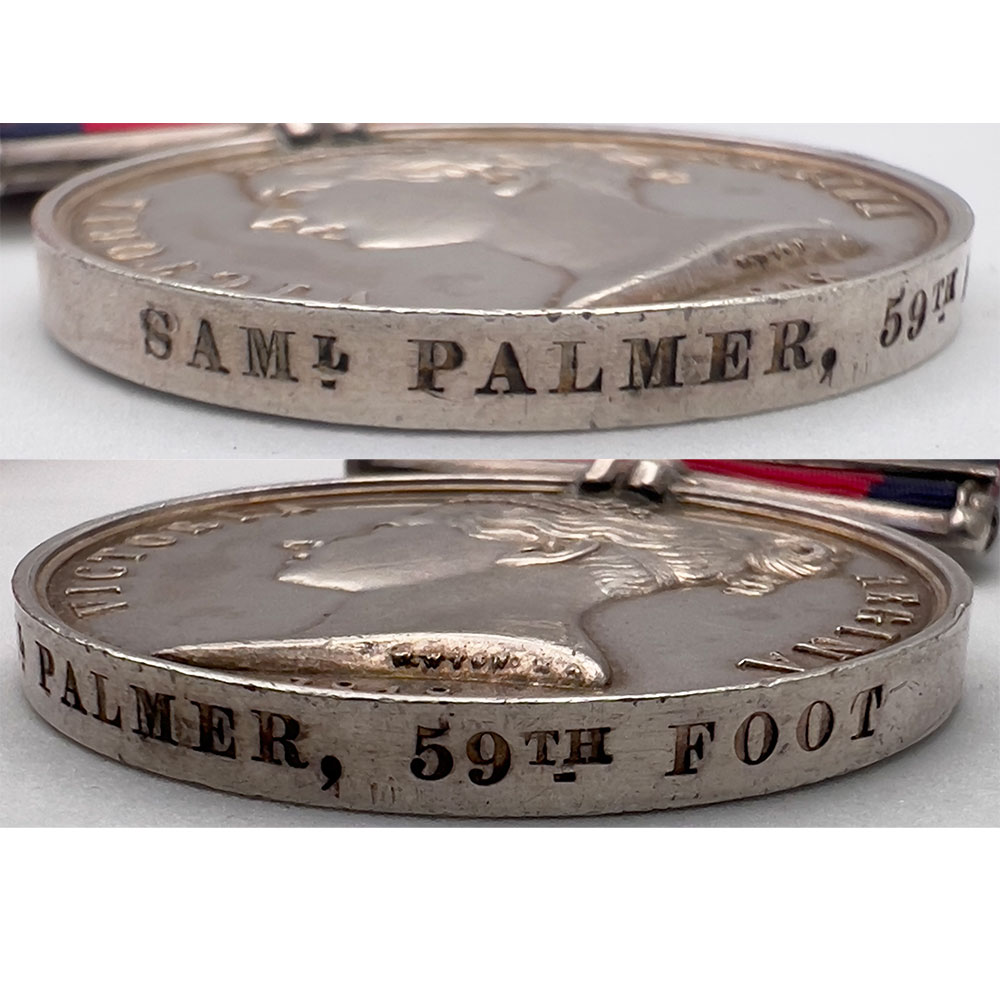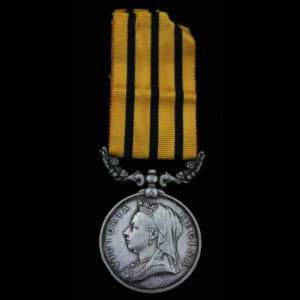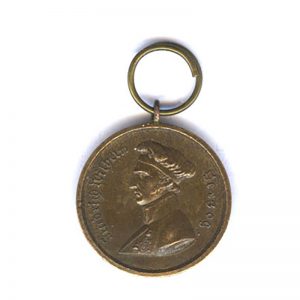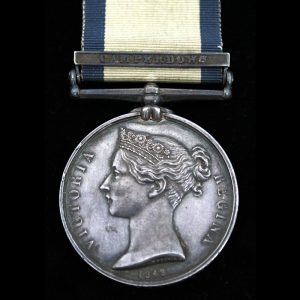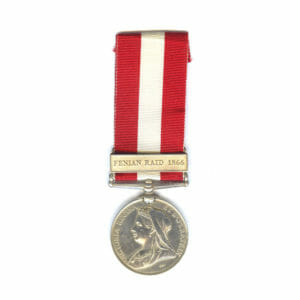Description
Military General Service Medal, bar Java, Private Samuel Palmer, 59th Foot, spent over 20 years in the East Indies, also stormed the Fortress of Bhurtpoor during 1826.
Officially impressed: “Saml Palmer 59th Foot”
Very good condition, confirmed on the medal roll and copy service papers.
Samuel received this medal multiple decades after he fought in the Invasion of Java (which occured during 1811) circa 1847.
Also being issued around that time the Army of India Medal, bar Bhurtpoor, for his Storming of that Fortress back in 1826.
He was also with the Battalion when they fought a very early victory in the history of South Africa against the Dutch in 1806, and when his battalion took part in the dismantling of the almost 150 year old Maratha Empire during 1817-19.
Provenance of this medal, noted first in Balwin January 1953 and then 1955, at the time in a pair with his Army of India Medal, since sold by Hayward in June 1972 as a singleton, so it is certainly out there.
Samuel Palmer was born in Stapleton, Bristol, Gloucestershire circa 1786.
He enlisted at Portsmouth on 1st September 1804 at the age of 18 for “Unlimited Service”.
He would go on to serve the regiment for 24 years, of which 22 of them were stationed overseas in the “East Indies”.
He took part in numerous important actions for the regiment.
During 1811 he took part in
Served 25th June 1804 to 23rd June 1828, East Indies from 22nd April 1806 to 8th June 1828.
After returning home from years away he was discharged as he for: “Being old and worn out.”
His conduct as a Soldier was described simply with one word as: “Tolerable”.
In later life, circa 1851, he lived in Adelaide Street, East Stonehouse, Devon, with his wife Mary Palmer (Born 1790, Willsbridge, Devon).
He was still there in 1861, a 74 year old “C Pensioner” Chelsea Pensioner (Out-Pension).
He looks to have died there in East Stonehouse, during 1863.
Samuel was a member of the 1st Battalion 59th (2nd Nottinghamshire) Regiment of Foot.
3 Months after he joined the regiment, they set off for the Cape of Good Hope, it was only recently that Britain had captured what would become later “South Africa” from the Dutch.
On 7th January 1806, the 1st Battalion was part of a brigade that landed at the cape, and within 2 days the Dutch VOC Forces surrendered.
Whilst the Regiment would suffer only 2 dead and 6 wounded, this would become the 59th very first “Battle Honour” and one of Britain’s first military activities in the “Cape Colony”.
The 1st Bn 59th Foot would then set off for India, his service records indicating he arrived there on 22nd April 1806 and would remain in the region for 22 years.
In November of 1810, the 1st 59th took part in the Invasion of Mauritius, and the next year Samuel would earn his “Java” Clasp when they invaded Java, part of the Dutch East Indies.
Notably during the campaign the 59th distinguished themselves in the attack on “Fort Cornelis”, the following account written by Lieut Col Gowan in 1897 from his father’s diaries:
“While Colonel Gibbs proceeded to the right, Colonel Gillespie continued his operations to the left and towards the enemy’s rear. All the batteries in succession were stormed and taken, and, having been joined by Lieut.-Colonel Alexander McLeod with H.M.’s 59th Regiment, Colonel Gillespie directed the attack on the enemy’s artillery park and reserve. The enemy’s cavalry formed up and threatened the right of the British line, but were repulsed by the well-directed fire of a party of the
59th sent against them.
The same gallant corps then moved in column along the face of the redoubt, within the body of the enemy’s works which Colonel Gillespie’s party had already taken, and gained the salient angle of their line of reserve which was drawn up in rear of their park guns and horse artillery with a double front nearly at right angles, their rear and flanks being covered by the barracks and the Dutch fort of Cornelis.
This attack was carried out with the greatest promptitude, and although the assailants were met. with a shower of grape, the enemy was driven from all his guns. An attempt was then made to effect a stand in front of Fort Cornelis under shelter of the barracks, whence a sharp musketry fire was kept up; but being soon driven from this last ground and the Dutch fort itself having been carried by our troops, the enemy broke and dispersed in all directions.”
Following the Invasion of Java, the battalion would move over to Celyon to be further embroiled in the 3rd Anglo-Maratha war of 1817-19, this important war would finally end the dominating Maratha Empire, which had been standing since 1674 until the British finally finished them off during their 3rd War of 1817-1819.
Samuel would earn his final battle honour in yet another war in the region, fought against the Bharatpur State during 1825-6.
During this war Samuel was part of the force that took part in the storming and capture of the Jat Fortress of Bharatpore, or Bharatpoor, as depicted on the later issued Army of India Medal clasp.
The 59th Foot had the unfortunate messy job of leading the attack and storming into the Breach that was blown in the Fortress by a Mine.
The Commander Captain Fisher notes of the heavy casualties by the 59th that he was attached to, his brigade of Gurkhas being deployed to fight with the 59th: “I am thankful to say we were in with the 59th, who covered themselves with glory – it was the most glorious sight eyes ever beheld.”
The despatches would also write:
“The conduct of H. M. 59th Regiment fully equalled the highest expectation the Major-General had formed, upon an experience of two months, during which he had never imputed to them a single fault. He told them on going down, that ‘England expected every man to do his duty’ — they re-echoed the sentiment, and have nobly redeemed the pledge. The manner of doing it, can never be effaced from his mind.
Major Fuller is earnestly requested to convey to his gallant Corps (59th Foot), the Major-General’s grateful thanks; and to receive them personally, for his judicious and spirited conduct, which indeed was conspicuously evident in every Officer who came within his observation.
The General would regret the heavy loss sustained by the 59th Regiment, did his experience not inform him, that great achievements are usually attended by heavy sacrifices.
Following the end of this war Samuel would return home to a well earned discharge, the years of campaigning leaving him as they said “Old and Worn out”.
